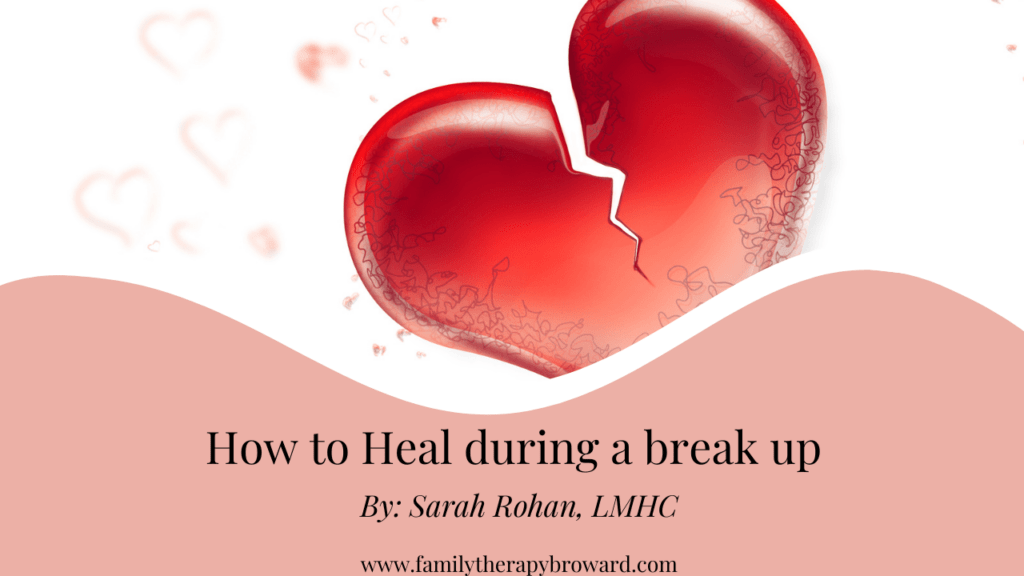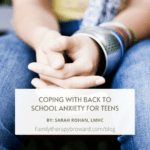
How to Heal During a break up?
Experiencing a breakup can be devastating. For many people, a breakup can trigger feelings of isolation, rejection, and loneliness. It is easy to get caught up in the What Ifs.
- What if I never find someone like my ex?
- What if I never find love?
- What if I am not capable of being in a relationship?
- What if I am not good enough?
This thinking will do nothing but create feelings of anxiety and sadness. Instead, be proactive and use this breakup as a chance to redirect your perspective, re-prioritize what you want in a relationship, clarify your non-negotiables and increase self-compassion. These actions will help you grow in confidence and stabilize your emotional well-being.
Here are a few ways to cope with a recent break up:
Feel the Feelings –
Going through a breakup is experiencing a loss. It is important to give yourselves permission to grieve. We may try to ignore painful feelings and attempt to move forward but if you give yourselves permission to process these feelings, we can loosen their grip on you and help you begin to heal. Many of us have a tendency to romanticize a relationship when it ends. You might remember all of the positive feelings and events when mourning the loss. Reflect on some of the negative qualities of your ex as well as negative aspects of the relationship. Ask yourself what are the benefits of this relationship ending? It may be helpful to create a list of negative aspects of the relationship to refer to in moments when you are tempted to reach out to your ex.
Set Boundaries –
It is difficult during a breakup if you are still in contact on a regular basis. Staying in contact makes it much more difficult to let go; it can only prolong the healing process. In addition, following your ex on social media can cause a lot of unnecessary emotional baggage. Avoid potential pain and regret by not reading recent posts or looking at old memories and events that you shared together. Consider unfollowing them or blocking them if it is necessary for your own well-being.
Seek Connection –
Reach out to friends and family who support you and build you up. Spend time with people who remind you of your positive qualities and strengths. You may need some time alone to heal and grieve but be careful not to isolate yourself. Enjoy the positive aspects of being single, go out with friends, experience new places and events together and have fun. Consider taking a class or engaging in a social activity such as a running club, book club, or any type of group that increases social connection and gives you the opportunity to meet new people.
Self-Care –
It is time to nourish and care for yourself. One of the best ways to do this is to get back to the basics of self-care which includes healthy eating, exercise, and sleep. Research in both the medical and mental health fields validate these three areas as contributing greatly to our sense of well-being. When you are grieving, it is easy to put self-care on the back burner and stay in and binge Netflix and order UberEATS. Do some research and learn how healthy foods and exercise can impact on how you feel mentally and physically. Review the correlation between good mental health and getting the appropriate amount of sleep. There are plenty of online resources and books that discuss the importance of these areas.
Reflect –
Our relationships often act as a mirror for us that showcases both our strengths and our weaknesses. Take some time to reflect on any personal characteristics that may have impacted the relationship. It is also useful to review past relationships and see if you notice any consistent patterns. Some areas for growth may include difficulty trusting others, fear of abandonment, codependency, jealousy or possessiveness to name a few. Increase self-awareness by reading books that address areas of desired growth.
Seek help from a therapist –
Choosing to see a therapist during a life transition like this can be beneficial especially if you feel like the experience is getting in the way of your day-to-day functioning. Therapists are well equipped to help you process loss and help empower you to remember your strengths and help you reconnect to things that will help you heal as an individual. If you are interested in meeting with a therapist, click on this link for further information.
Written by Sarah Rohan
From Monica's bio...
I believe that our journey is filled with many unimaginable turns and twists. The key is to understand just how to deal with every single turn without losing our path. I know this first hand, not only from having relocated from a different country into the United States but also from having lived in different states from New York to New Jersey and finally Florida where I have settled with my family and children.













